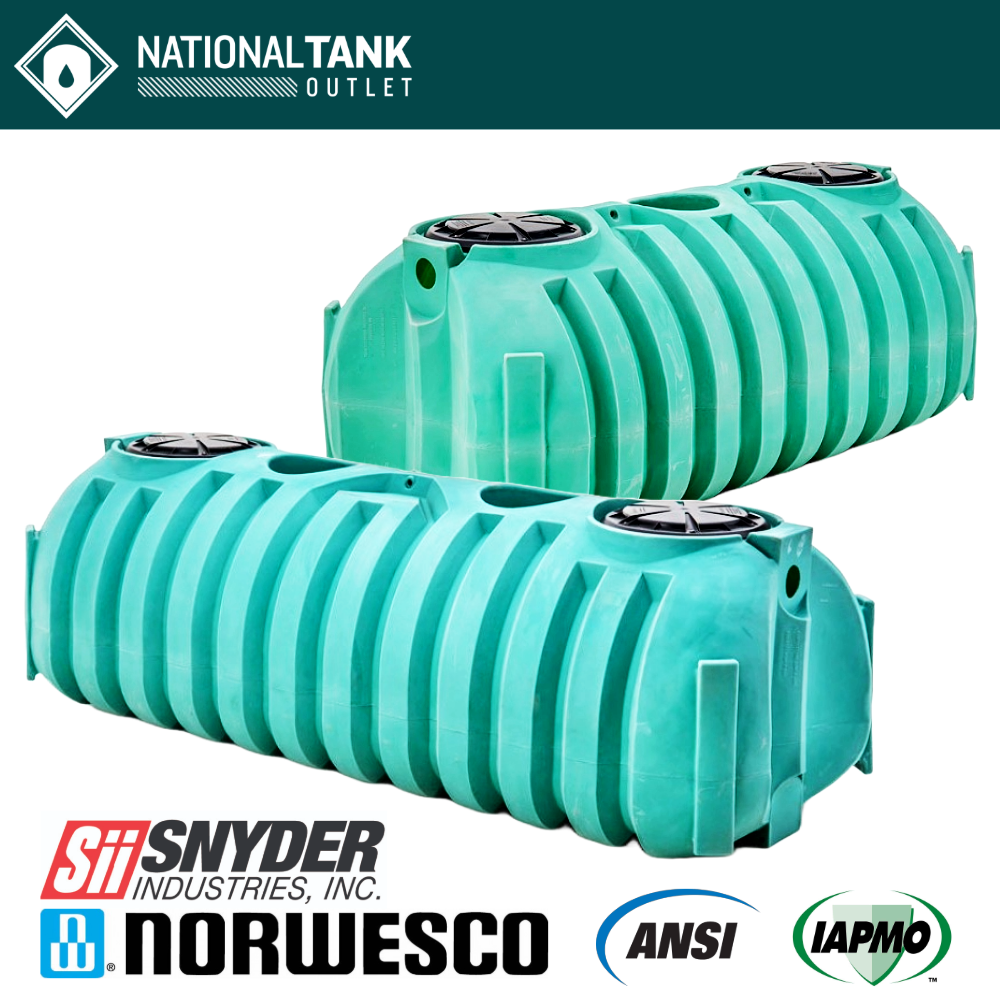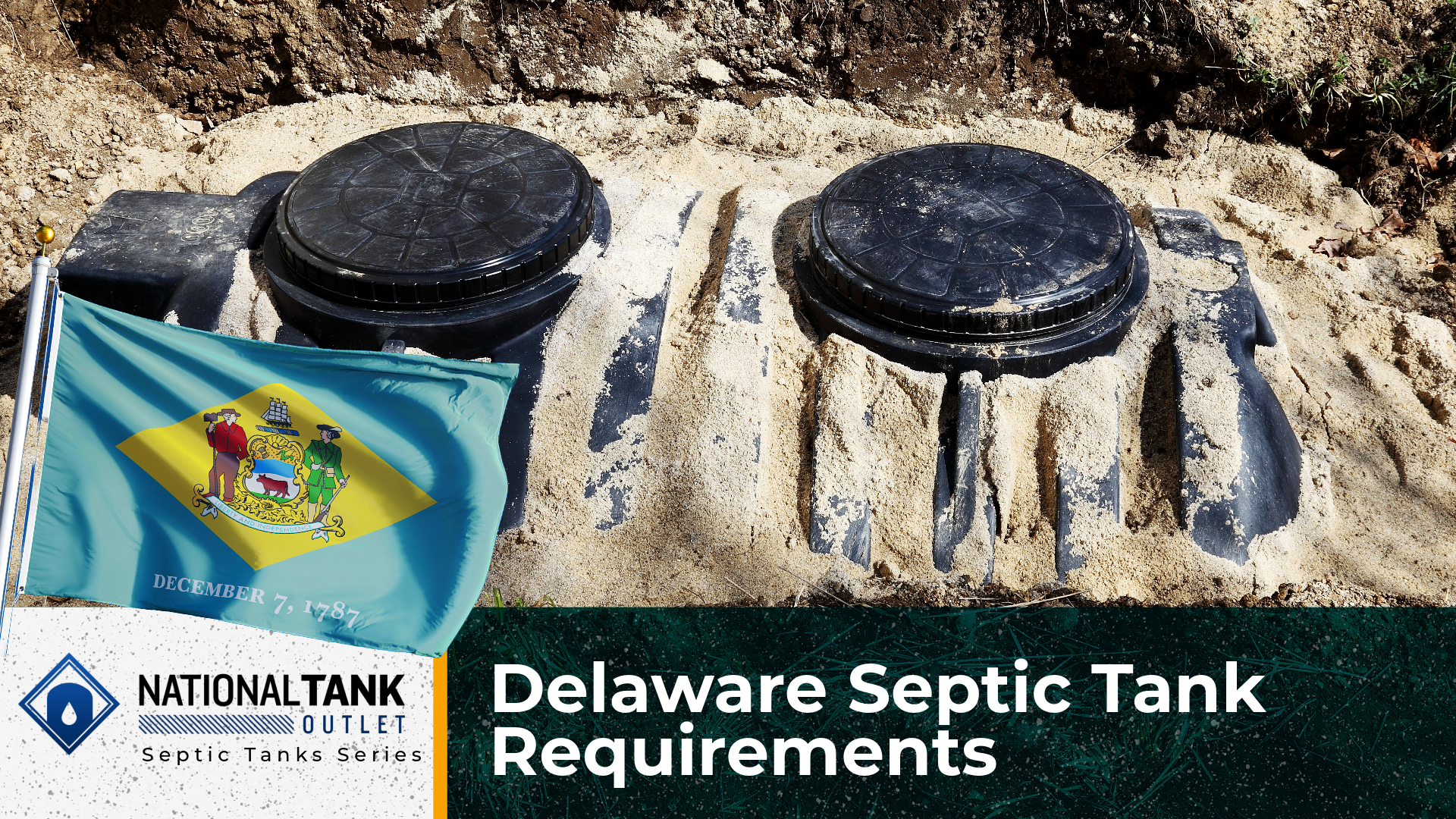
For Delaware residents and businesses that reside beyond the reach of municipal sewer lines, septic tanks are the primary way to manage wastewater on the property. Septic tank systems are vital and work quietly to treat waste from fixtures for sanitation and public health. In Delaware, approximately 20% of the state’s 1 million+ population rely on a septic tank system. When it comes to their design, installation, and maintenance, Delaware septic tanks are governed by a set of regulations to ensure they operate properly and effectively. In this guide on Delaware septic tank requirements, we will outline the key points that new residents, homebuilders, businesses, and contractors need to know.
Delaware State Septic Tank Regulations
The primary authority that governs septic tank regulations in Delaware is the Department of Natural Resources and Environmental Control (DNREC) through its Division of Water.

In Delaware, the guidance document that outlines the framework for waste management systems is titled the Regulations Governing the Design, Installation and Operation of On-Site Wastewater Treatment and Disposal Systems (7 DE Admin. Code 7101). In addition to this, local districts may have additional regulations, so it is always important to check with your local authorities for any specific requirements.
The Delaware Division of Water sets categories and departments to handle residential septic systems as well as commercial and government septic systems.
Delaware Septic Tank Definitions
In Delaware State, the term used by the state departments and guidance documents for what is commonly known as a septic tank system is an On-Site Wastewater Treatment and Disposal System, often abbreviated OWTDS. This term includes the complete working system used to treat and dispose of wastewater from the property where it is generated. The system may also be called a Sewage Treatment System and abbreviated STS.
Can I Install My Own Septic Tank in Delaware
The answer to this question is both no, you cannot install your own septic tank in Delaware, and yes, you can. According to the 7 DE Admin. Code 7101 on OWTDS regulations, a septic system installer must be a Class E System Contractor. To become a Class E System Contractor, an individual must have the necessary experience, education, testing, and certification to become duly licensed in the state of Delaware.

Additionally, the steps necessary in septic tank installation – i.e., site evaluation, soil tests, and system designing – must be completed by likewise licensed professionals. In Delaware, site evaluations are to be done by a Class D Soil Scientist / Site Evaluator and perhaps a Class A Percolation Tester. System designing is to be done by a Class B Designer or Class C Designer.
Temporary Licensing
With this said, according to the DNREC regarding groundwater discharge licenses, “property owners who wish to conduct their own percolation testing, system design or system installation on their own property and for their own use may apply for a temporary Class A, B, or E license”. Information regarding this is limited; however, it can be assumed that in order to receive a temporary license, the individual will have to complete qualifications, perhaps pass tests, and submit forms with associated fees.
Recommendations
While it may be technically possible to legally install your own septic tank system in Delaware, the process is best left to professionals due to the extent of planning, evaluations, designing, and construction requirements.
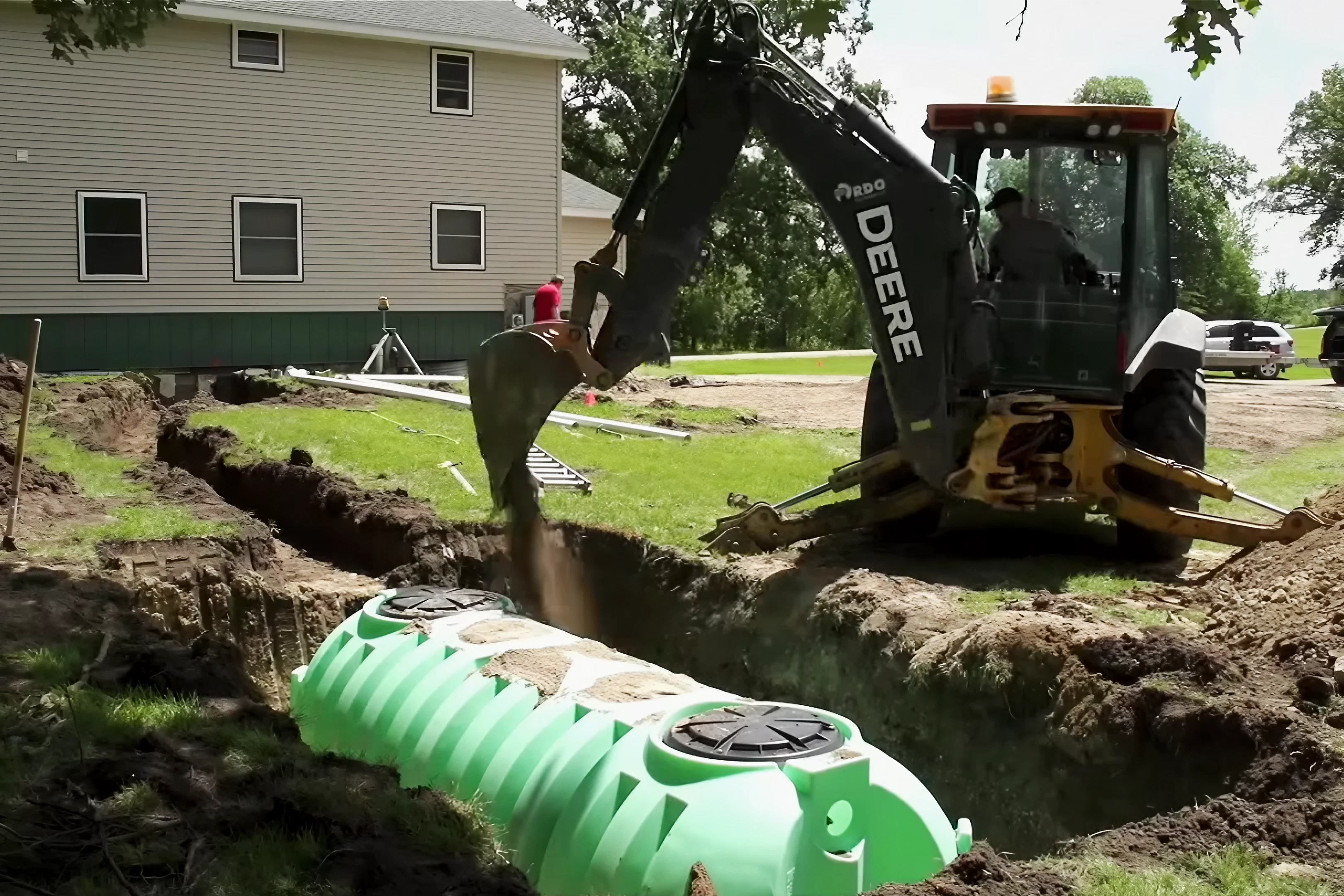
However, if you are a homeowner capable and confident to install your own septic tank, or a contractor looking for a trustworthy supplier, the National Tank Outlet has you covered with modern poly septic tanks made by Delaware State approved manufacturers.
Can a Polyethylene Septic Tank Be Installed and Used in Delaware
Yes, polyethylene septic tanks are approved for installation and use in Delaware. Polyethylene plastic septic tanks are often favored for their durability, ease of installation, low weight, maneuverability, and long-term value. However, not all poly septic tanks on the market are created equal. In fact, the state of Delaware only approves a select number of septic tanks made by particular manufacturers. Most notably on their list are the trusted U.S. tank manufacturers Norwesco and Snyder Industries.
According to the Delaware DNREC, the primary septic tanks that are approved for use range in size from 1000 gallons to 1500 gallons and typically are designed to be low profile tanks. If looking for these septic tanks, the National Tank Outlet provides Delaware approved poly septic tanks.
Key Delaware Septic Tank Requirements
Permits
According to 7 DE Admin. Code 7101 Section 5.3, a permit is required before any construction or repair of a septic tank system. In the case of work permits, the state of Delaware has separate permits for small systems and large systems. Small systems have a wastewater flow expected less than 2,500 gallons per day (GPD), and this will be most residential and small commercial properties. Large systems have a wastewater flow expected greater than 2,500 GPD, which is more common in commercial complexes, industrial facilities, hospitals, etc.
Before a construction permit can be issued, Delaware State DNREC requires a site evaluation to be performed, submitted, and reviewed before any other installation activities. Property site evaluations for septic systems in Delaware are performed by a licensed Class D soil scientist / site evaluator.
Site Evaluations
In Delaware, site evaluations for a new septic tank typically involve a soil evaluation to determine geology and water permeation rates as well as an overall inspection of the local topography. These evaluations must be performed by a Class D soil scientist / site evaluator and/or a Class A percolation tester, unless you qualify for a temporary license to perform these evaluations yourself.

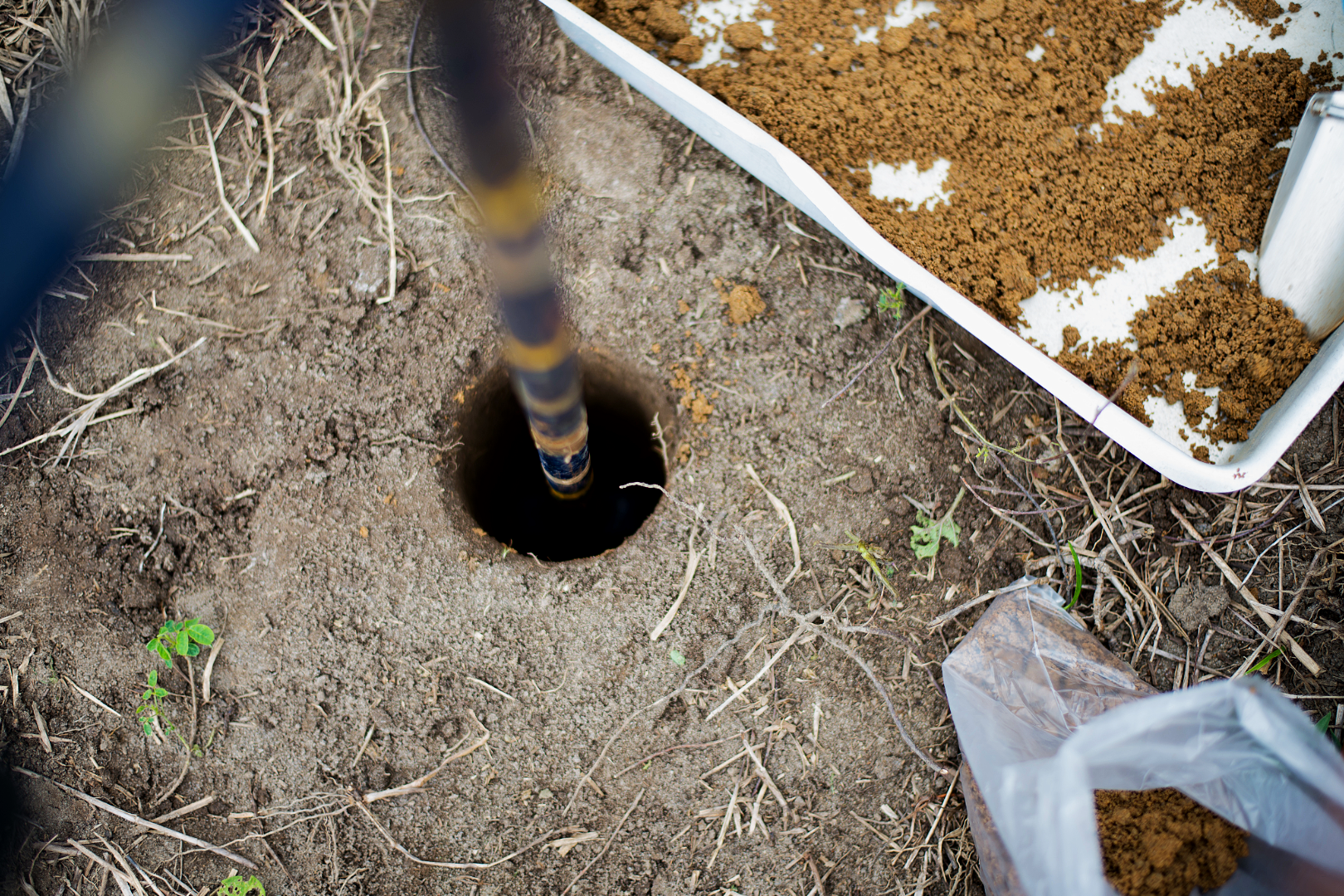
Septic System Siting and Design
In the state of Delaware, septic tank systems are either a conventional gravity fed system or an alternative or experimental system such as an elevated sound mound system or a micro-irrigation drip system. The proper siting and design for a new septic tank system will depend on the results from the site evaluation, the property type, and the amount of wastewater the property will regularly generate. Key points on septic system siting include minimum distances from wells, water bodies, property lines, and other structures.
Conventional septic systems are typically to be designed by a Class B standard designer and alternative systems by a Class C engineered designer. Delaware State’s list of approved Class B licensees can be found here and the list of approved Class C licensees here.
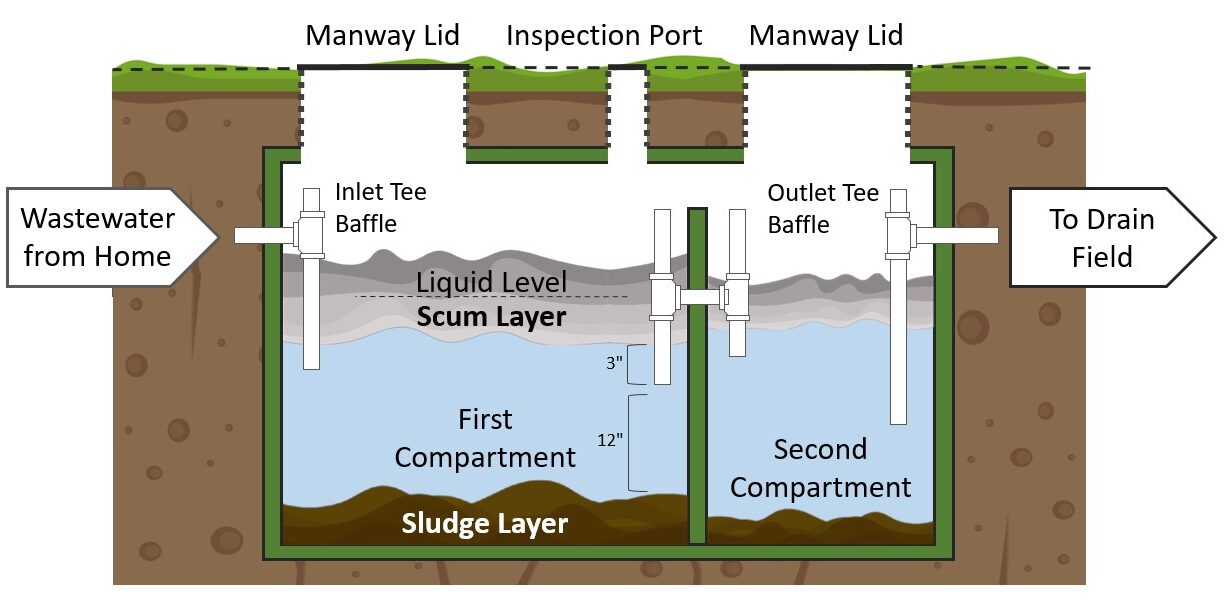
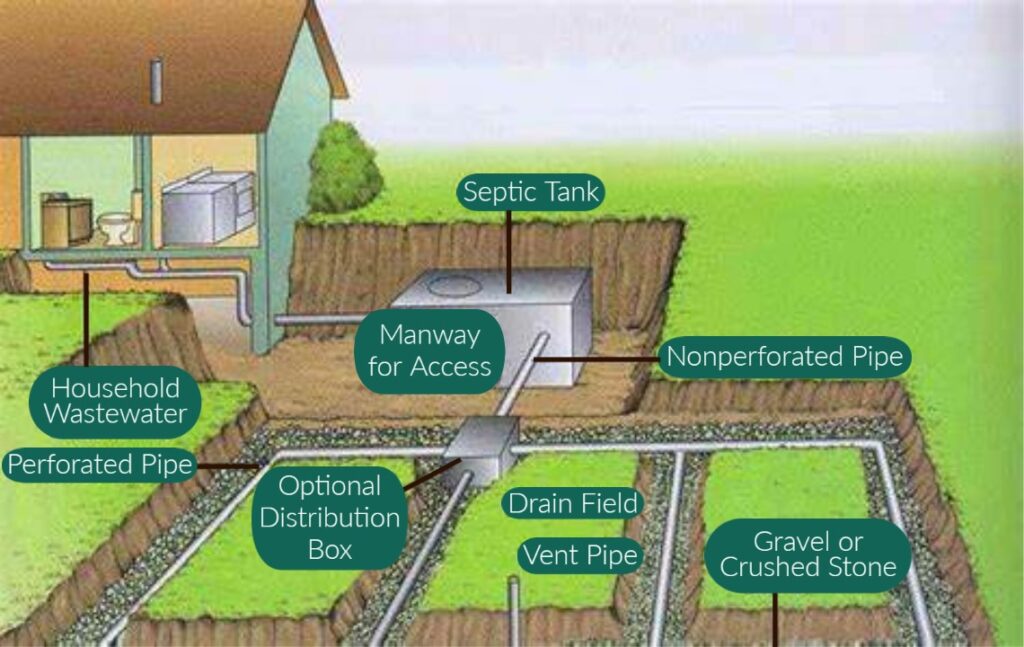
Septic System Components
Septic tank systems must be sized and built according to regular expected wastewater flow, specifics for the property, and regulations. The size of the septic tank, the amount of plumbing, and the drainfield will all depend on what is needed for the site. The standard septic tank used for on-site wastewater treatment systems must be a two compartment septic tank. Septic tanks are required to have an outlet effluent filter.
For residential installations, the Simply Septics document from the DNREC provides a good overview of the installation process, different septic systems, and their components.
Septic Tank Size Required in Delaware
The septic tank size required in Delaware is based on the expected amount of daily wastewater flow. According to 7 DE Admin. Code 7101 5.3.14.4, the working capacity of septic tanks with flows less than 500 GPD will be 1,000 gallons, and with flows over 500 GPD but less than 2,500 GPD will be 1,500 gallons.
Septic Tank Installation in Delaware
Installation of a septic tank system in Delaware must be performed by a licensed Class E system contractor or individual capable of receiving a temporary license. The system contractor must comply with all local codes and regulations, including those related to the system’s location, depth, and manufacturer’s requirements for the septic tank.
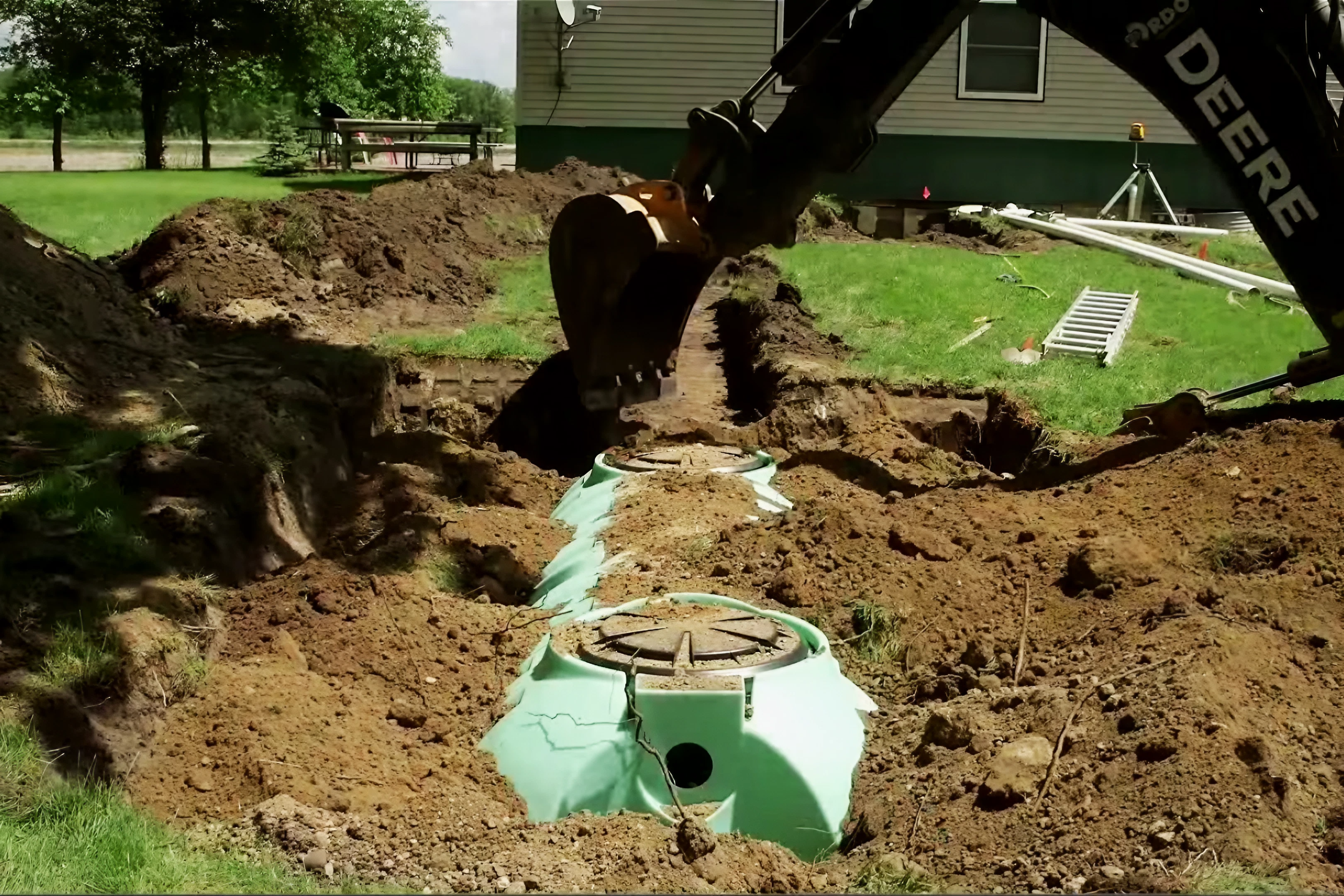
Maintenance and Pumping
Regular septic tank maintenance includes pumping and inspections of cleanable or working parts to ensure optimal system performance. Delaware State guidance recommends septic tanks to be pumped once every 3 years. Septic tank pumping frequency can depend on the system size, usage, and local regulations and can be required more often for commercial properties. Delaware septic tanks should be pumped by a Class F liquid waste hauler.
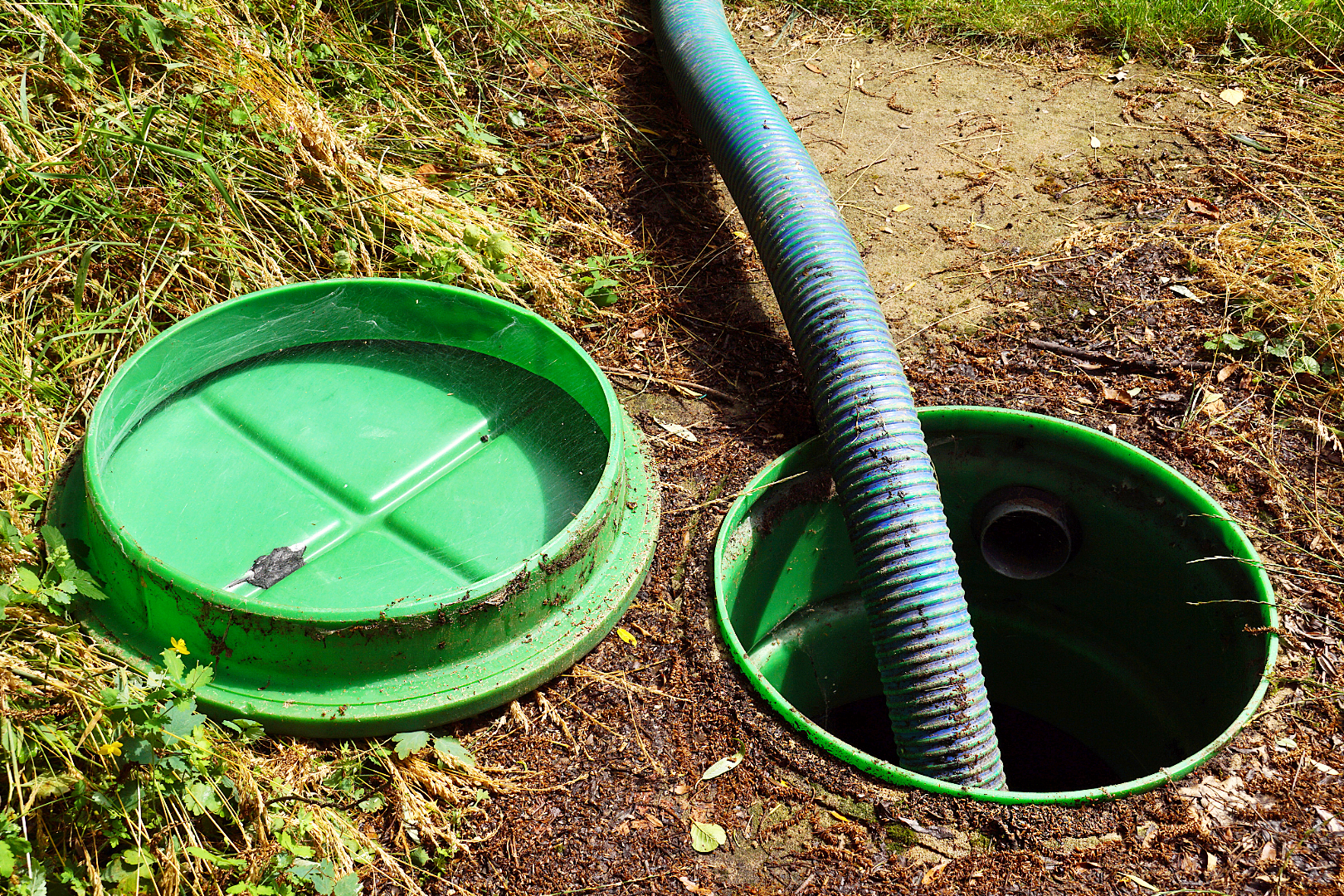
Financial Assistance
The Delaware State government and DNREC have a Septic Rehabilitation Loan Program that can provide low-interest loans to help repair or replace failing septic tank systems or cesspools with a modern, more effective on-site wastewater management system up to code and regulations.
Transfer of Ownership
Delaware regulations require all properties with an OWTDS that are sold or otherwise have a transfer of ownership to have the system pumped out and inspected by a Class F and Class H licensee before the sale is complete.
Need a Septic Tank in Delaware? Choose the National Tank Outlet
If you’re a homeowner or contractor in the state of Delaware looking to buy a septic tank, you can trust the National Tank Outlet. Our comprehensive range of high-quality, roto-molded poly septic tanks provide lasting durability, corrosion resistance, ease of installation, and long-term value. With volumes ranging up to 20,000 gallons, explore our catalog of Delaware approved septic tanks or contact us to discuss quotes on high-volume tanks for contractors.

Additional Resources
- DNREC Division of Water
- DNREC Division of Water Contacts
- Delaware Licensed Septic System Professionals
Disclaimer: This guide is intended to provide general information and expectations around the installation and requirements of a septic tank and system in the state of Delaware and is not intended to substitute for advice, legal counsel, or consultation from state departments or licensed professionals. The information provided is current and accurate to the best of our knowledge at the time of this writing. For specific advice on your individual situation, please consult with the Delaware Division of Natural Resources and Environmental Control (DNREC), your local county department, or a licensed septic tank professional contractor.
